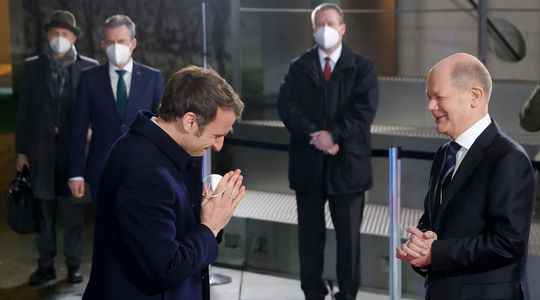The meeting was supposed to last only two hours, but ended up being eight and a half hours long. “It was long, it was difficult, but the result is there”, confides a participant, exhausted after a day of negotiations under tension. Wednesday, January 26, for the first time since the escalation of tensions on the Ukrainian border, diplomats from Moscow and Kiev met in a room at the Elysée to discuss, in the company of French and German advisers.
Result of these hours of tough negotiations: a joint communiqué on the need to preserve the ceasefire in the Donbass, “regardless of differences on other subjects”, and the promise to meet again in two weeks, in Berlin this time. While Washington and London warn of a Russian invasion before mid-February and keep their troops on alert, Paris hopes to become the capital of Russian-Ukrainian negotiations. “We got the re-engagement signal [des Russes] we were looking for, explains a source at the Élysée. We now have a process which should allow us to check how far we can go in the negotiations, and we have deadlines for doing so.” The timetable is indeed not insignificant.
A narrow diplomatic path
In recent days, Emmanuel Macron has placed his diplomatic pawns. France, which holds the presidency of the Council of the EU, places itself in all negotiation formats with Russia (“Normandy” group, NATO, Quad, etc.) and works to harmonize European positions. This Friday, at 10.45 a.m., it is as French president and “in office” president of the Council of the EU that Emmanuel Macron will be on the phone with Vladimir Putin, to offer him a “path of de-escalation”. “At the moment T, the president thinks there is space for diplomacy, he is convinced that we have the means to avoid a major crisis in Europe”, assures one of his diplomatic advisers.
Emmanuel Macron walks on a ridge line, between the explicit threats of the Kremlin and the now muscular response from Washington. The European Union, long snubbed by Moscow, now seems a more reasonable interlocutor, less warlike, than its Anglo-Saxon allies. It is still necessary that the Twenty-Seven agree on a common position… “France must play this role of European cohesion, because Germany traditionally has a fragmented position on Russia and its internal differences send contradictory signals in Moscow, analyzes a member of the French government. Europe must be very clear and very firm in its responses to Russian provocations. Already, we see less naivety on the part of Europeans than during the invasion of Crimea in 2014 .”
French diplomacy remains cautious in public and avoids showing off. But behind the scenes, she does not hesitate to praise her action on the negotiating front: rarely have so many foreign journalists been invited to the Elysée briefings… On the ground, however, the situation remains explosive, while the States United and NATO firmly rejected Moscow’s main demands. At the Élysée, we know that the slightest incident at the border could degenerate and we must at all costs prevent a possible failure of diplomacy from being perceived as a French failure.
So, in parallel with the discussions, Paris is also showing its muscles. This Thursday, France is sending experts to Romania, before a probable deployment of French soldiers on the spot. “It is essential to find the right balance between openness to dialogue and firmness,” said a government source. A variant of the “at the same time” so dear to Emmanuel Macron, this time put to the test by Vladimir Poutine.
